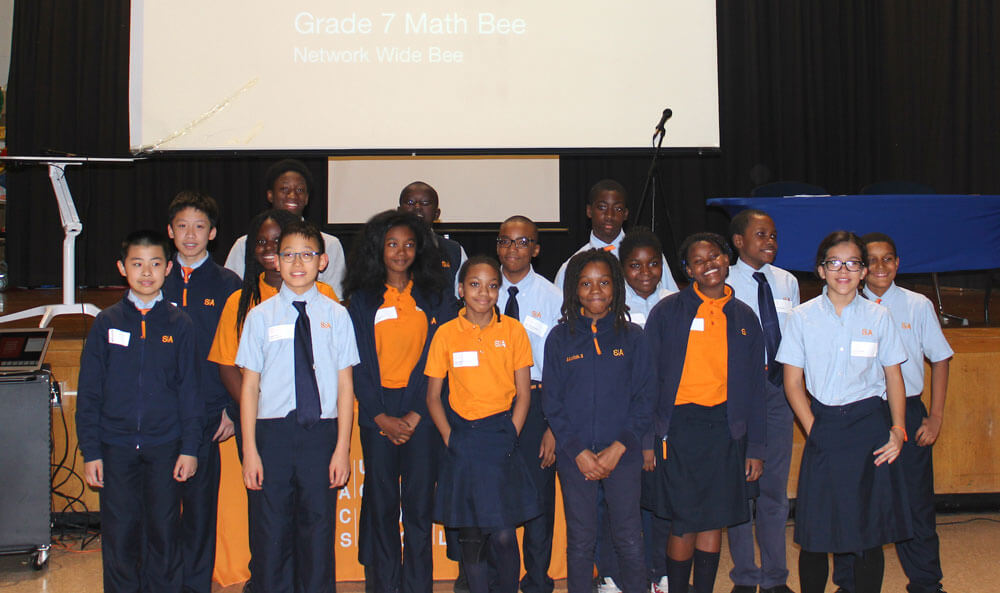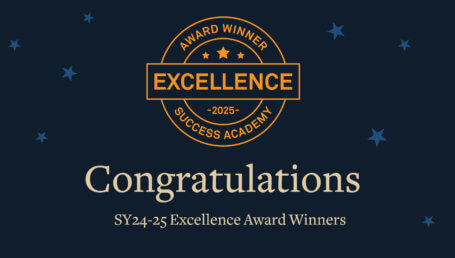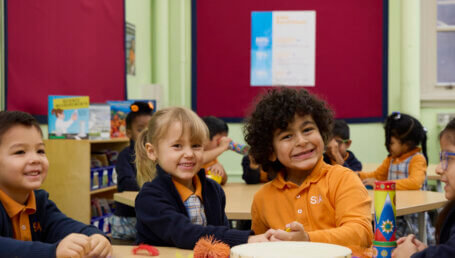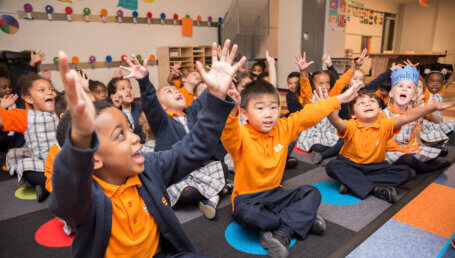

Imagine yourself on a stage — you’re 11 years old and about to perform — but instead of tap dancing or singing, you’re here to calculate. You’re presented with a question: Find a number, n, so that when you multiply n by itself, you get the product 0.000081. There are only thirty seconds allotted to solve it, but you’ve already figured out the answer; it’s 0.009. Congratulations! You’ve just won the Success Academy Math Bee!
Scholars from across the network recently competed in our annual grade-level Bees. The Bees are a chance to demonstrate how agile and accurate — and confident — they are in their problem solving and calculation abilities. After winning classroom and school-wide Bees, the top scholars come together to compete for the coveted honor of being the fastest calculator in the network.
But what do the Bees have to offer beyond excitement, honor, and glory? We checked in with two Success Academy Math Bee fans to hear their take on what this annual tradition offers our scholars. Zalima Barazani is the dean of students at SA Harlem 1, who helped coordinate this year’s Math Bees at her school. Kareena Pamani teaches math to 4th graders at at SA Harlem 2. Both believe in the power of the Bees — particularly in the importance of scholars learning to trust their own abilities.
Besides being fun for everyone involved, how do the Math Bees help scholars?
Zalima: They help our scholars with a number of transferable skills. It’s really not about the answer; it’s about having the mental agility to take the information that you’re given and problem solve — quickly and with confidence! Math is a complex subject, but they’re gaining a foundational understanding while simultaneously seeing that it can be both interesting and exciting.
Kareena: I also have to point out the transferable skills. They are learning to think quickly under pressure and to articulate the answer in front of an audience. I also love the Bees because the experience gets every single scholar involved and invested in math. They all want to make it to the next round — to put their best foot forward — and be the final competitor at the classroom and school level, to compete at grade level. Even if they don’t necessarily love math, they fall in love with the thrill of competing and cheering for each other!
How do your scholars gain the confidence for the Bees?
Zalima: We equip them with multiple strategies so that they know they have the tools needed to handle new problems. They use the same kind of skills elsewhere, like in chess, and in younger years, in phonics. Some of our second graders didn’t have the benefit of doing math with us in kindergarten and first grade, so they have to catch up. But when they’re in front of the class, being encouraged by their peers, you can see their confidence grow. They really feel supported!
I just love it when a scholar gets up in front of the class and can express, with confidence: “I’m good at math, and I want to show the world!” The loud and proud element is the best part about the Bees! One second grader, Lazeta, is really pretty shy usually — but this year, I watched as she really came into her own during the Bee. And she won the classroom round!
Kareena: In our classroom, those scholars who are “out” go back to sit at their desks. This creates a cheering squad, and it’s inspiring to see them call encouragement to their peers who are still competing. I love seeing the sportsmanship and camaraderie displayed by our scholars, who don’t feel discouraged but rather determined for next time if they have to sit out a round.
Congratulations to all our scholars who made it to the 2018 Network Math Bees!










